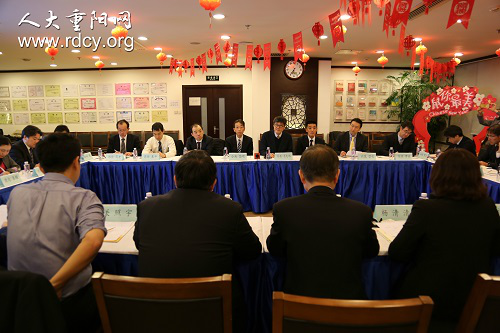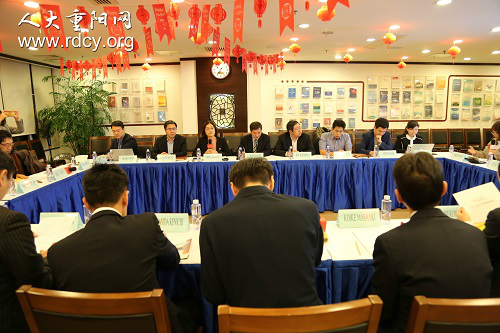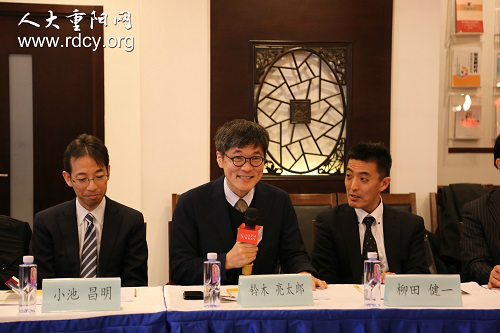Belt and Road
Your Present Location: PROGRAMS> Belt and RoadThe delegation of Japanese government officials visits RDCY
Editor's note: On January 13, 2020, a delegation of Japanese government officials, organized by China Public Diplomacy Association, pays a visit to Chongyang Institute for Financial Studies, Renmin University of China (RDCY). The visiting delegation, led by deputy director of the Training Department of National Personnel Authority Suzuki Ryotar, consists of 16 officials from 14 Japanese government departments including National Personnel Authority, Cabinet Office, Ministry of Foreign Affairs of Japan and the Japanese Ministry of Defense. The delegation members and Chinese experts have a communication on Belt and Road Initiative (BRI),Chinese economy and finance, China-Japan humanities exchange and other subjects.
The meeting is presided over by Yang Qingqing, associate dean of RDCY. She welcomes the visiting experts and introduces the main work and achievements of RDCY in recent years. Having reviewed the interactions between RDCY and Japanese various communities in the past, she hopes to strengthen China-Japan humanities exchanges in the context of increasingly close relationship between China and Japan.

The delegation of Japanese government officials
In the discussion, Japanese representative shows great concern about China’s economic trends. They mention that China’s economic growth rate is around 6% in 2019, down from previous years. The Japanese government and private groups concern whether China’s economy will continue growing in the future. Jia Jinjing, associate dean of RDCY give a response: the reason why China’s economy is slowing down is that China is committed to the supply-side reform and the adjustment of economic structure. China values quality development more than quantity development in economy, and the world should not worry too much about China’s slowing down economy.

The Chinese experts and scholars
Deputy director of Industrial Research Department of RDCY, Bian Yongzu and research fellow Liu Ying agree that China is accelerating the financial opening up in the domestic market and is adjusting the financial structure. There is a long journey for China in the process, which is a great chance for Japan and other international institutions.
Associate researcher of International Studies Department of RDCY Guan Zhaoyu suggests that Japan should focus on the overall development of BRI and view BRI from China’s perspective. He thinks that Japanese can participate in the BRI through the cooperation in third markets. Visiting fellow of Institute of Japan Studies in Liaoning University Chen Yang also believes that it is essential for China and Japan to maintain the mutual exchange and learn from each other.

Head of the Janpanese delegation Suzuki Ryotar
In the end, Suzuki Ryotar, head of the delegation gives a conclusion that Japan should carry out an objective assessment of BRI and the visit is a good opportunity to learn BRI. According to him, there are a large group of Chinese tourists to Japan every year, and the China-Japan non-governmental exchanges are no less than the official communication. At present, the public in Japan holds positive views about China. The Japanese government should help the Japanese people know China comprehensively and promote China-Japan humanities exchanges.























































































 京公网安备 11010802037854号
京公网安备 11010802037854号





